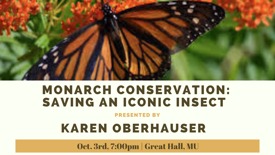Monarch Conservation: Saving an Iconic Insect
Karen Oberhauser
Thursday, 03 Oct 2019 at 7:00 pm – Great Hall, Memorial Union
Karen Oberhauser is the director of the University of Wisconsin-Madison Arboretum and the founder and director of the Monarch Larva Monitoring Project, a nationwide citizen science project. She will discuss the ways in which human activities affect monarch butterfly habitats, including her research on habitat management and availability and the risks posed by global climate change and pest control practices. Oberhauser has a strong interest in engaging K-12 students and teachers in inquiry-based science and promoting scientific and environmental literacy. As part of the Monarch Larva Monitoring Project, she developed a comprehensive science education program, Monarchs in the Classroom. Paul L. Errington Memorial LectureThe University Bookstore will be on site to sell copies of The Monarch Butterfly.
Karen Oberhauser earned her undergraduate degree from Harvard, and graduate degrees at the University of Wisconsin, Madison (MS) and the University of Minnesota (PhD).
Cosponsored By:
- Agronomy
- College of Agriculture & Life Sciences
- College of Liberal Arts & Sciences
- Ecology & Evolutionary Biology Program
- Ecology, Evolution & Organismal Biology
- Iowa Cooperative Fish & Wildlife Service
- Iowa Monarch Conservation Consortium
- Natural Resource Ecology & Management
- Committee on Lectures (funded by Student Government)
Stay for the entire event, including the brief question-and-answer session that follows the formal presentation. Most events run 75 minutes.
Sign-ins are after the event concludes. For lectures in the Memorial Union, go to the information desk in the Main Lounge. In other academic buildings, look for signage outside the auditorium.
Lecture Etiquette
- Stay for the entire lecture and the brief audience Q&A. If a student needs to leave early, he or she should sit near the back and exit discreetly.
- Do not bring food or uncovered drinks into the lecture.
- Check with Lectures staff before taking photographs or recording any portion of the event. There are often restrictions. Cell phones, tablets and laptops may be used to take notes or for class assignments.
- Keep questions or comments brief and concise to allow as many as possible.



